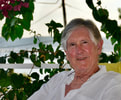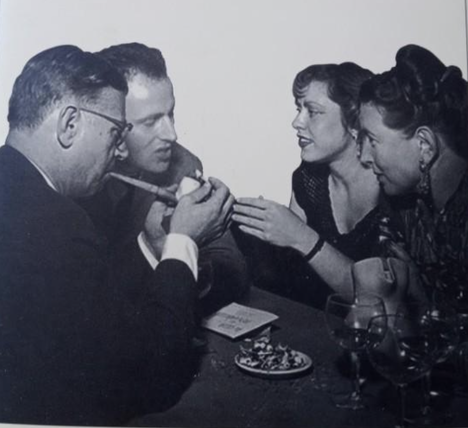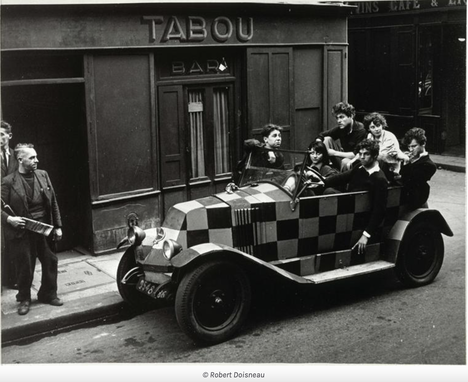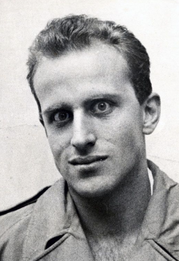 Boris Vian
Boris Vian
Boris Vian (1920-1959), little-known (to Americans) and a late-bloomer even in France, was an irrepressible, whirl-wind presence in the post-WWII scene in Paris. Often described as a polymath, he wrote poems, hundreds of songs, short stories, 12 novels, screen plays, music, opera librettos, music criticism, and was an actor, translator and inventor. The content of his novels veered into absurdist surrealism and were filled with puns, slapstick and comedy that likely impeded their translation into English. In most accounts of intellectual life in Paris during the postwar years, Vian is mentioned in the same sentence with Jean-Paul Sartre, Simone de Beauvoir, Albert Camus, Maurice Merleau-Ponty and other notables. Although much of his activity extends beyond the boundaries of “chanson,” he is a larger-than-life character who contributed a singular dimension to the vibrant cultural scene of postwar Saint Germain des Près.
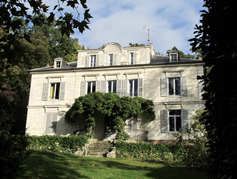 La Villa Fauvettes, Ville d'Avray
La Villa Fauvettes, Ville d'Avray
Vian was born in the Ville d’Avray, a wealthy suburb west of Paris. His parents were Paul George Vian and Yvonne Ramenez, an amateur pianist and harpist. His mother selected his name Boris following a performance of Mussorgsky’s opera Boris Gudonov. The family lived in an elegant “hotel particulier” (freestanding mansion) La Villa Fauvettes next to the Parc de Saint Cloud. Author Edmond Rostand’s family were neighbors and Jean Rostand was Boris’ playmate. After the 1929 crisis brought economic difficulties, the Vians rented their main residence to the family of Yehudi Menuhin from 1930-35 and moved into an adjacent cottage. Boris’s father was murdered at home in 1944 under mysterious circumstances.
Although it would be too little to characterize him as a “jack of all trades,” an image of Boris emerges of a merry prankster and a compulsive experimenter. Some of his experiments were more successful than others. Research has identified 27 pseudonyms of which his favorites were anagram versions of his real name: “Bison Ravi” or “Bris Avion” or “Baron Visi.” His most notorious impersonation was Vernon Sullivan, an entirely made-up name from the combined names of two friends in the Claude Abadie jazz band. One wonders at his need to disguise his identity and to lurch between every imaginable form of expression from novels to poems, songs, essays, and more, even when they were injurious to his physical or psychological well-being. Doctors advised him against playing trumpet because of his weak heart and the stress from awkward public appearances singing must have been severe. His association with the College of Pataphysics founded in 1948 was a curiosity that brought him in contact with like-minded absurdists Eugène Ionesco and Raymond Queneau. Established by French writer Alfred Jarry (1873-1907) as a parody of science, pataphysics has been termed a “science of imaginary solutions.” It proposed that, through the heightened vision of poetry or song, the imaginary nature of things can be experienced as real. One can draw links between pataphysics and Boris’s infatuation with “surprise parties,” “zazou” dancing and his surrealistic writing.
During WWII Vian was unfit for military service for health reasons, so he worked for several years as an engineer at the Association Française de Normalisation (AFNOR), the French office of standardization. This was surely a mind-numbing job creating standards for glassware. He had varied employment thereafter as a journalist, trumpeter, translator, music critic, head of the jazz department at Philips Records, and impresario of jazz music in Paris. During the rest of his time, he pursued his literary and musical interests and threw parties.
Although it would be too little to characterize him as a “jack of all trades,” an image of Boris emerges of a merry prankster and a compulsive experimenter. Some of his experiments were more successful than others. Research has identified 27 pseudonyms of which his favorites were anagram versions of his real name: “Bison Ravi” or “Bris Avion” or “Baron Visi.” His most notorious impersonation was Vernon Sullivan, an entirely made-up name from the combined names of two friends in the Claude Abadie jazz band. One wonders at his need to disguise his identity and to lurch between every imaginable form of expression from novels to poems, songs, essays, and more, even when they were injurious to his physical or psychological well-being. Doctors advised him against playing trumpet because of his weak heart and the stress from awkward public appearances singing must have been severe. His association with the College of Pataphysics founded in 1948 was a curiosity that brought him in contact with like-minded absurdists Eugène Ionesco and Raymond Queneau. Established by French writer Alfred Jarry (1873-1907) as a parody of science, pataphysics has been termed a “science of imaginary solutions.” It proposed that, through the heightened vision of poetry or song, the imaginary nature of things can be experienced as real. One can draw links between pataphysics and Boris’s infatuation with “surprise parties,” “zazou” dancing and his surrealistic writing.
During WWII Vian was unfit for military service for health reasons, so he worked for several years as an engineer at the Association Française de Normalisation (AFNOR), the French office of standardization. This was surely a mind-numbing job creating standards for glassware. He had varied employment thereafter as a journalist, trumpeter, translator, music critic, head of the jazz department at Philips Records, and impresario of jazz music in Paris. During the rest of his time, he pursued his literary and musical interests and threw parties.
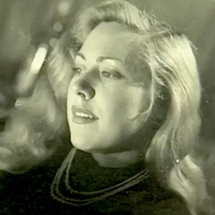 Michelle Léglise Vian
Michelle Léglise Vian
In 1941 Boris married Michelle Léglise. They had met in 1940 at a party in Capbreton north of Biarritz where his family found refuge in unoccupied southwestern France. She was a French translator and poet and shared his enthusiasm for jazz and dancing. She taught English to Boris and inspired the character of Chloé in his novel L’Écume des Jours.
Boris and his wife Michelle enjoyed giving parties. Boris and his two brothers had cultivated a partying tradition at their home in Ville d’Avray where they hosted “surprise parties” fueled by mescaline with hundreds of friends. These were unscripted social gatherings where “convention gave way to invention, and the more wayward the invention the better.”Boris named one of his short poems “Surprise Party” that provides a pinhole peep at the experience. At a party in 1946, Boris and Michelle hit the jackpot and became acquainted with Jean-Paul Sartre, Simone de Beauvoir, and Albert Camus, gaining entrée to their literary circles.
After they married, Boris and Michelle lived in her parents’ apartment at 98 rue du Faubourg Poissonière in the 11th arrondissement and spent many weekends at the Vian family home in Ville d’Avray. Beginning 1946, the Vians took to visiting the Mediterranean village of Saint Tropez in summer along with other leading lights from Saint Germain des Près. Boris quickly became a figure of note at the Hotel La Ponche there and penned a satirical documentary film about the experience: Saint Tropez: Devoir de Vacances.
After Michelle and Boris separated in 1953, she worked as secretary for Jean-Paul Sartre and maintained a romantic affair with him until his death in 1980. Boris and his second wife Ursula Kubler, a Swiss ballerina at the Paris Opera, whom he met in 1950 and married in 1954, lived for a while in a 6th floor maid’s apartment at 8 Blvd de Clichy. Later, they moved nearby to 6 bis Cité Véron where they shared a terrace overlooking the Moulin Rouge with their neighbor, poet and fellow surrealist, Jacques Prévert. This location was just around the corner from Jacques Canetti’s Les Trois Baudets theater that was the home of “chanson.”
Boris and his wife Michelle enjoyed giving parties. Boris and his two brothers had cultivated a partying tradition at their home in Ville d’Avray where they hosted “surprise parties” fueled by mescaline with hundreds of friends. These were unscripted social gatherings where “convention gave way to invention, and the more wayward the invention the better.”Boris named one of his short poems “Surprise Party” that provides a pinhole peep at the experience. At a party in 1946, Boris and Michelle hit the jackpot and became acquainted with Jean-Paul Sartre, Simone de Beauvoir, and Albert Camus, gaining entrée to their literary circles.
After they married, Boris and Michelle lived in her parents’ apartment at 98 rue du Faubourg Poissonière in the 11th arrondissement and spent many weekends at the Vian family home in Ville d’Avray. Beginning 1946, the Vians took to visiting the Mediterranean village of Saint Tropez in summer along with other leading lights from Saint Germain des Près. Boris quickly became a figure of note at the Hotel La Ponche there and penned a satirical documentary film about the experience: Saint Tropez: Devoir de Vacances.
After Michelle and Boris separated in 1953, she worked as secretary for Jean-Paul Sartre and maintained a romantic affair with him until his death in 1980. Boris and his second wife Ursula Kubler, a Swiss ballerina at the Paris Opera, whom he met in 1950 and married in 1954, lived for a while in a 6th floor maid’s apartment at 8 Blvd de Clichy. Later, they moved nearby to 6 bis Cité Véron where they shared a terrace overlooking the Moulin Rouge with their neighbor, poet and fellow surrealist, Jacques Prévert. This location was just around the corner from Jacques Canetti’s Les Trois Baudets theater that was the home of “chanson.”
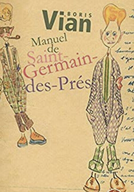
Despite his informal title “Prince of Saint Germain des Pres,” Boris never actually resided there, which is just one of many incongruities. He did spend innumerable nocturnal hours there, however, and in 1951 he published "Le Manuel de Saint Germain des Prés" which solidified his identification with the quartier.
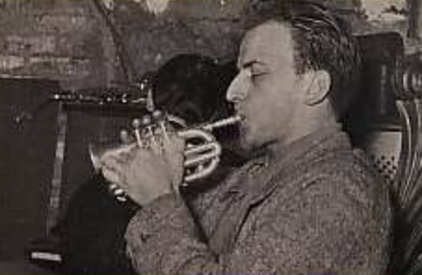 Boris and "trompinette"
Boris and "trompinette"
Vian was an important presence on the French jazz scene as songwriter and performer, but especially as journalist and impresario. His spiritual awakening came in 1937 when he heard Duke Ellington play at Salle Pleyel in Paris. He was admitted to the major French jazz club, Le Hot Club de France and, along with his brothers Lélio (guitar) and Alain (drums) took up playing the trumpet in Claude Abadie’s jazz band. Boris’s preferred instrument was a New Orleans-style device that he called a “trompinette.”
He became a regular trumpeter with the band at Le Tabou at 33 rue Dauphine and later at the Club Saint Germain. Le Tabou (now Café Laurent) was a mythic cellar jazz club beneath the Hotel d’Aubusson with a rare “late-night” permit (after midnight) that became what Vian called “a veritable sanctuary for the new generation.” He served as an intermediary for artists like Hoagy Carmichael, Cab Calloway, Duke Ellington and Miles Davis. Ellington became godfather for Vian’s daughter. In 1948, Boris opened the Club Saint Germain and organized gigs for the likes of Miles Davis and Charlie Parker.
There is a rough sequence to Vian’s creative endeavors. His interest in performing jazz trumpet and organizing jazz events arose during the 1930s and he continued throughout as an impresario. His journalistic endeavors were episodic and ongoing as well, especially after the war. His novelistic career began in 1947 but petered out by 1951. Then he turned to songwriting and some singing though the latter activity was short-lived and expired by 1956. In 1950, he set aside the trumpet definitively for health reasons: “each note played on it shortens my life by a day.” He continued after 1951 to write screenplays and scenarios. In his final years, he took a job in 1956 at Philips to create a catalog of jazz, and in 1958 became artistic director at Fontana.
Vian’s most celebrated novel was L’Écume des Jours (1947) (“The Froth of Days”), in which inanimate objects respond to human emotions. The main female character, Chloé, was dying from a waterlily growing in her lung. It has been translated into several English editions known variously as "Froth on the Daydream" (1967), "Mood Indigo" (1968), and "Foam of the Daze" (2012) [NB: the word “Daze” in that title is somebody’s pun on the word “Days”]. Michel Gondry’s 2013 film “Mood Indigo” adapted Vian’s novel and borrowed the title from the earlier translation. Gondry, born in France, had experienced Vian’s novel as an adolescent. The film received at best a mixed reception when it appeared in France (130 minutes) and 15 months later in the US (90 minutes). Vian’s fingerprints also appear in Gondry’s earlier film “Eternal Sunshine of the Spotless Mind” (2004). The original “Mood Indigo” was the 1930 jazz composition by Duke Ellington and Barney Bigard (music) with Irving Mills (lyrics). Just as Vian’s language was difficult to translate into English, his imagery was challenging to render in films without excessive gimmickry.
Vian’s most commercially successful novels were a literary hoax. He published 4 novels between 1947 and 1949 under the pseudonym of Vernon Sullivan. These were bizarre and surrealistic parodies of criminal fiction. The first book in 1947 was “I'll Spit on Your Graves” (“J’irai cracher sur vos tombes”) which Vian wrote in 2 weeks for a friend who was launching a new publishing house, Editions du Scorpion. Vian claimed that Sullivan was a black American writer living in France to escape US racism and censorship. He pretended, with some credibility in view of his work as a translator, that he had only translated Sullivan’s work. The books themselves were set in the US, which Vian had never visited, and the main character was a negro who passed for white and went on a sex and murder rampage.
Vian’s inspirations for this book were apparently drawn from his black American jazz musician friends and American crime novels that he had translated. J’irai cracher sur vos tombes suddenly became a best seller in France in 1947 after a right-wing lawsuit accused it of violence and explicit sexual content. Then, a copy of the book with circled passages was also found in a Paris hotel room where a man had strangled his lover. To his discomfort, Vian’s authorship of the book soon became known and in 1950 the government banned it.
As a music journalist, Vian wrote for several French jazz-reviews (Le Jazz-Hot, Paris Jazz, Jazz News, and Combat) and published numerous articles dealing with jazz. Vian had mixed success in the world of song. He wrote more than 500 songs, but was not well-endowed with either vocal or performance skills. The political backlash from Le Déserteur episode in 1954 was a setback and he had difficulty gaining acceptance for his songs by other performers. In 1955, Vian decided to perform songs on stage himself but his stage presence was stiff and wooden and his voice was tinny. His stint as a singer lasted only between December 1954 and March 1956, and history left only one album of Vian singing his own songs (“Chansons Possibles et Chansons Impossibles”). He continued to write and compose, however, and many of those songs were interpreted posthumously by other singers.
Ironically, and almost as though he had written the script himself, Vian died in 1959 of cardiac arrest at the Cinema Marbeuf. He was attending a screening of a French film adaptation of his book (“Spit”) that he roundly disapproved. While watching the credits, he cried out: “These guys are supposed to be American? My ass!” and collapsed in his seat. He died going to the hospital.
In 1965, Jacques Canetti offered 12 Boris Vian songs to Serge Reggiani, leading to Reggiani’s first album “Serge Reggiani sings Boris Vian.” By 1968, Vian’s work gathered postmortem momentum in tune with the youthful rebellious spirit of the times. In 2019, the 100th anniversary of Vian’s birth, Editions Jacques Canetti published a celebratory 4 CD assemblage of 100 Vian songs by various interpreters. La Cohérie Boris Vian and La Fond’Action Boris Vian tends his memory to this day. The most enduring of Vian's songs is featured below in one version by him and another by Marcel Mouloudji.
Vian/Mouloudji Song: Le Déserteur
Vian’s most celebrated novel was L’Écume des Jours (1947) (“The Froth of Days”), in which inanimate objects respond to human emotions. The main female character, Chloé, was dying from a waterlily growing in her lung. It has been translated into several English editions known variously as "Froth on the Daydream" (1967), "Mood Indigo" (1968), and "Foam of the Daze" (2012) [NB: the word “Daze” in that title is somebody’s pun on the word “Days”]. Michel Gondry’s 2013 film “Mood Indigo” adapted Vian’s novel and borrowed the title from the earlier translation. Gondry, born in France, had experienced Vian’s novel as an adolescent. The film received at best a mixed reception when it appeared in France (130 minutes) and 15 months later in the US (90 minutes). Vian’s fingerprints also appear in Gondry’s earlier film “Eternal Sunshine of the Spotless Mind” (2004). The original “Mood Indigo” was the 1930 jazz composition by Duke Ellington and Barney Bigard (music) with Irving Mills (lyrics). Just as Vian’s language was difficult to translate into English, his imagery was challenging to render in films without excessive gimmickry.
Vian’s most commercially successful novels were a literary hoax. He published 4 novels between 1947 and 1949 under the pseudonym of Vernon Sullivan. These were bizarre and surrealistic parodies of criminal fiction. The first book in 1947 was “I'll Spit on Your Graves” (“J’irai cracher sur vos tombes”) which Vian wrote in 2 weeks for a friend who was launching a new publishing house, Editions du Scorpion. Vian claimed that Sullivan was a black American writer living in France to escape US racism and censorship. He pretended, with some credibility in view of his work as a translator, that he had only translated Sullivan’s work. The books themselves were set in the US, which Vian had never visited, and the main character was a negro who passed for white and went on a sex and murder rampage.
Vian’s inspirations for this book were apparently drawn from his black American jazz musician friends and American crime novels that he had translated. J’irai cracher sur vos tombes suddenly became a best seller in France in 1947 after a right-wing lawsuit accused it of violence and explicit sexual content. Then, a copy of the book with circled passages was also found in a Paris hotel room where a man had strangled his lover. To his discomfort, Vian’s authorship of the book soon became known and in 1950 the government banned it.
As a music journalist, Vian wrote for several French jazz-reviews (Le Jazz-Hot, Paris Jazz, Jazz News, and Combat) and published numerous articles dealing with jazz. Vian had mixed success in the world of song. He wrote more than 500 songs, but was not well-endowed with either vocal or performance skills. The political backlash from Le Déserteur episode in 1954 was a setback and he had difficulty gaining acceptance for his songs by other performers. In 1955, Vian decided to perform songs on stage himself but his stage presence was stiff and wooden and his voice was tinny. His stint as a singer lasted only between December 1954 and March 1956, and history left only one album of Vian singing his own songs (“Chansons Possibles et Chansons Impossibles”). He continued to write and compose, however, and many of those songs were interpreted posthumously by other singers.
Ironically, and almost as though he had written the script himself, Vian died in 1959 of cardiac arrest at the Cinema Marbeuf. He was attending a screening of a French film adaptation of his book (“Spit”) that he roundly disapproved. While watching the credits, he cried out: “These guys are supposed to be American? My ass!” and collapsed in his seat. He died going to the hospital.
In 1965, Jacques Canetti offered 12 Boris Vian songs to Serge Reggiani, leading to Reggiani’s first album “Serge Reggiani sings Boris Vian.” By 1968, Vian’s work gathered postmortem momentum in tune with the youthful rebellious spirit of the times. In 2019, the 100th anniversary of Vian’s birth, Editions Jacques Canetti published a celebratory 4 CD assemblage of 100 Vian songs by various interpreters. La Cohérie Boris Vian and La Fond’Action Boris Vian tends his memory to this day. The most enduring of Vian's songs is featured below in one version by him and another by Marcel Mouloudji.
Vian/Mouloudji Song: Le Déserteur
